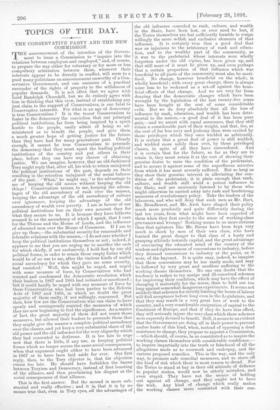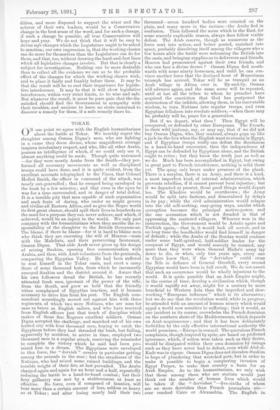TOPICS OF THE DAY.
THE CONSERVATIVE PARTY AND THE NEW COMMISSION.
THE announcement of the intention of the Govern- ment to issue a Commission to "inquire into the relations between employers and employed," and, of course, to prepare the way either for voluntary or for more or less compulsory arbitration between them, wherever their interests appear to be directly in conflict, will seem to a good many politicians an announcement unworthy of a Con- servative Government, and one ominous of a practical surrender of the rights of property to the selfishness of popular demands. It is not often that we agree with Lord Randolph Churchill, but we do entirely agree with him in thinking that this view, instead of establishing any just claim to the support of Conservatives, is one fatal to Conservative interests. For what in an age of democracy is true Conservatism ? It is the truest Conservatism to foster in the democracy the conviction that our principal political institutions, far from being inspired by a spirit hostile to the people, easily admit of being so ad- ministered as to benefit the people, and give them a much greater hope of getting justice for the future than they have had for many generations past. Clearly enough, it cannot be true Conservatism to persuade the democracy that they must upset the leading political institutions of the country and put others in their place, before they can have any chance of obtaining justice. We can imagine, however, that an old-fashioned Tory might reply that, after all, his wish to retain uninjured the political institutions of the past, depends on their resulting in the retention uninjured of the social balance of the past. 'What,' he might say, ' is the advantage to me of keeping the old names without keeping the old things? Conservatism means, to me, keeping the advan- tages of the old ascendency of rank over the masses, keeping the advantage of the old ascendency of culture over ignorance, keeping the advantage of the old ascendency of wealth over poverty. I am in favour of our political institutions less on their own account than for what they secure to us. It is because they have hitherto secured to us the ascendency of which I speak, that I care for the Throne and the House of Lords, and the influence of educated men over the House of Commons. If I am to give up these,—the substantial security for reasonable and tolerable relations with the masses,—I do not care whether I keep the political institutions themselves or not ; indeed, it appears to me that you are urging me to sacrifice the ends for which chiefly, if not exclusively, I hold fast by our old political forms, in order to retain those empty forms Which would be of no use to me, after the various kinds of useful social. ascendency for which they gave me some security, had vanished.' Well, this might be urged, and urged with some measure of force, by Conservatives who had resisted and condemned the democratic revolution which their leaders in 1867 and 1885 had initiated or sanctioned ; but it could hardly be urged with any measure of force by those Conservatives who had been parties to the Reform Acts of 1867 and 1885, in which no doubt the great majority of them really, if not willingly, concurred. But then, how few are the Conservatives who can claim to have openly and courageously resisted the measures of which they are now beginning to feel the significance. As a matter of fact, the great majority of them did not resist those measures, but allowed their leaders to persuade them that they might give the masses a complete political ascendency over the classes, and yet keep a very substantial share of the old power and the old influence for the very oligarchy which they had consented to dethrone. It is too late to :urge now that there is little, if any use, in keeping political forms which no longer secure the same social consequences, when that argument ought either to have been advanced in 1867 or to have been laid aside for ever. Our first reply, then, to the Tory objector is, that his objection comes too late. He should have forbidden the banns between Toryism and Democracy, instead of first boasting of the alliance, and then proclaiming his disgust at the social consequences of that alliance.
This is the first answer. But the second is more sub- stantial and really effective ; and it is, that it is by no means true that, even in Tory eyes, all the advantages of the old influence conceded to rank, culture, and wealth. in the State, have been lost, or ever need be lost, if the Tories themselves are but sufficiently humble to resign willingly the more selfish and exclusive elements of that influence. It is certainly true that a good deal that was as injurious to the aristocracy of rank and educa- tion, and to the wealthy part of the community, as- h was to the proletariat whose interests were wholly forgotten under the old regime, has been given up, and that still more of it must be given up, and even perhaps that a certain proportion of that influence which was beneficial to all parts of the community must also be sacri- ficed. No change, however beneficial on the whole, is- wholly beneficial ; with every great change, there is always. some loss to be reckoned as a set-off against the bene- ficial effects of that change. And we are very far from denying that the democratic changes which have been wrought by the legislation of the last twenty-five years have been bought at the cost of some considerable evils. But we do deny absolutely that all the loss of influence by rank, education, and wealth has been detri- mental to the nation,—a good deal of it has been pure gain,—and we assert with equal assurance, that they still retain a considerable part of their weight, and that, too, at the cost of far less envy and jealousy than were excited by those privileges which they once wielded so arbitrarily. It is certain that a great deal of power is still wielded, and wielded more safely than ever, by these privileged classes, in spite of all they have surrendered. And it is certain that for the future, so far as they are to retain it, they must retain it at the cost of showing their genuine desire to raise the condition of the proletariat, and to secure it against some of the superfluous miseries from which it has most severely suffered. But so long as they show their genuine interest in alleviating the con- dition of the proletariat, it is plain enough that rank, culture, and wealth still wield a potent influence in the State, and are anxiously listened to by those who, might otherwise be carried away into rash and headstrong. measures of revolutionary policy. Take the leaders of the labourers, and who will deny that such men as Mr. Burt, Mr. Broadhurst, and Mr. Arch have shaped their policy much more prudently and quite differently during the last ten years, from what might have been expected of them when they first awoke to the sense of working-class grievances and wrongs? Nothing seems to us more obvious than that agitators like Mr. Burns have been kept very much in check by men of their own class, who have learned the great danger to that class of a hasty and grasping attitude towards capital, and the great advantage of convincing the educated mind of the country of the wisdom and righteousness of concessions to industry, before they demand concessions to industry at the point, as it were, of the bayonet. It is quite easy, indeed, to imagine that these concessions may be too easily made, and may be followed by very great and needless suffering to the working classes themselves. No one can doubt that the tendency is rather to try unripe and ill-conceived schemes for improving their condition, which may have the effect of changing it materially for the worse, than to hold out too long against somewhat dangerous experiments. It seems not unlikely that schemes for strictly limiting the hours of labour will find acceptance before long even in the Legislature, and that they may result in a very great loss of work to the country, and a very considerable emigration of capital to the Continent of Europe, and that if they do have this effect, they will seriously injure the very class which these schemes were expressly devised to benefit. Still, it seems tons evident that the Government are doing all in their power to prevent undue haste of this kind, when, instead of opposing a dead resistance to change, they propose to appoint a Commission, —which should, of course, be so constituted as to inspire the working classes themselves with considerable confidence,— to inquire impartially into the truth or falsehood of all the allegations made as to overwork and underpay, and the various proposed remedies. This is the way, and the only way, to promote safe remedial measures, and to stave off the kind of risk which there is most reason to dread. For the Tories to stand at bay in their old attitude of defiance to popular wishes, would now be utterly mistaken, and even stupid. They have not the means of holding out against all change, and they ought not to have the wish. Any kind of change which really makes the working classes more contented with their con- dition, and more disposed to support the wiser and the soberer of their own leaders, would be a Conservative change in the best sense of the word, and for such a change, if such a change be possible, all true Conservatives will hope and pray. We do not think that it will be easy to devise safe changes which the Legislature ought to be asked to sanction; our own impression is, that the working classes can do more for themselves than the Legislature can do for them, and that, too, without drawing the hard-and-fast lines which all legislative changes involve. But that is clearly a subject for investigation. Nothing can be more desirable than to collect all the evidence we can as to the probable effect of the changes for which the working classes wish, and to place it fairly and frankly before them. It may be that the result will be to cool their impatience for legisla- tive interference. It may be that it will show legislative interference, within very strict limits, to be wise and safe. But whatever the result, it must be pure gain that the dis- satisfied should find the Government in sympathy with their troubles, and anxious to leave no stone unturned to discover a remedy for them, if a safe remedy there be.







































 Previous page
Previous page